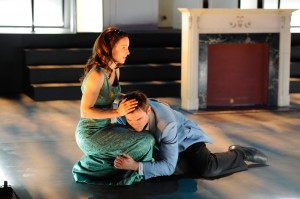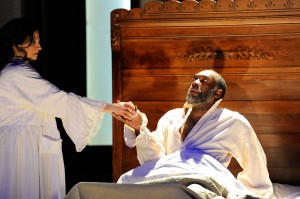
“If I had been he I would have done what he did! I would have loved her as he loved her—and killed Father too—for her sake! [. . .] It’s queer! It’s a rotten dirty joke on someone!”
There are plenty of things to thrill over in Quintessence Theatre Group’s stirring, and impressively-performed, MOURNING BECOMES ELECTRA. Director Alex Burns and his well-picked ensemble continue to impress.
Eugene O’Neill isn’t done nearly as often as Shakespeare, Tennessee Williams, Chekhov or even Ibsen. In our quest to revive the classics, he’s often skipped over because of the monumental task of making his, let’s face it, melodramatic and tin-eared sentence constructions live in a modern audience’s ears. (Similarly, Aeschylus and other Greek juggernauts rarely find a home on Philly’s stages.) Burns and his company have succeed in both performance and design, with a lightness and grace which might have seemed impossible. Here, O’Neill’s long, martial stagger into history is relatable, even musically concordant.
“[W]hat has struck me most while working on Mourning Becomes Electra,” says Burns in the director’s note, “is that the central force in this play is love. [. . .] And only when love is rendered impossible, do any of our protagonists give up on life.”
The real treat of this play is the politicking, the deadly striving of love and hate between matriarch Catherine Mannon (Janis Dardaris), her puritanical yet young and beautiful daughter Lavinia (Mattie Hawkinson), and her beloved son Orin (Josh Carpenter), in whom the naive, petted sweetness of youth has been bent and bloodied by the murder of war.
Familial inevitability interposes itself on their quest for happiness. One more struggle always stands between circumstance and joy, and Lavinia and Orin suffer constantly over the poison of ancient Mannon sins, subsequently cursing and embracing the Mannon family identity. As she strives deeper into her scheming, Lavina begins to take on her father’s martial sternness and even, unhappily, her mother’s manipulative coddling.
The nearly four-hour monolith (including a few brief intermissions) is a trial for any actress playing Lavinia, and Hawkinson, who’s had a few small parts in previous Quintessence shows, is an absolute thrill. Her Lavinia is an untiring, earnest, willful moral question mark. She remains likable from start to finish because we see her struggle but never quite understand her motives, can never completely pin down her true intentions. Hers might be one of the major theatrical accomplishments of 2014.

Much is said about O’Neill’s “masks.” His characters wear masks as faces, his (in)famously stilted language masks the Freudian complexes underneath, and when it comes to ELECTRA, even their formidable homestead’s facade is a mask. Burns’ stark set design features tall double doors and four shuttered windows set slightly upstage of four 12-foot-tall, commanding columns of light. These lights, towering over the mostly-bare thrust stage underneath, can be dimmed, turned off, flickered, or boomed into existence. When at full power, they serve as the stern, Victorian columns of the Mannon homestead, and dwarf the people who attempts to live under them.
Burns’ production skips lightly through time, from the original setting of the Civil War, through WWII, to the Korean War (always at the very end of the war, the promise of peace and the cleaning of battlefields), abstracting O’Neill’s historical setting and granting the Mannon curse a kind of vampiric inevitability. The play, presented in an almost completely uncut format, is accompanied by an original score by sound designer Steven Cahill, heightening O’Neill’s melodrama and driving the action forward.
Don’t be afraid of the length of the show. Hawkinson, Dardaris and Carpenter in particular are incredibly watchable, taking O’Neill’s deeply sick characters and exploiting all their cryptic possibilities. Though there one or two weak links in the supporting cast, Quintessence has succeeded eminently, giving theatergoers stuck in the Center City rut a great reason to break with routine and visit Mt. Airy. [Sedgewick Theater, 7137 Germantown Ave.] April 2-27, 2014. http://quintessencetheatre.org/.

As a fellow Phindie writer checking in, I want to say I admire your view: “O’Neill’s long, martial stagger into history is relatable, even musically concordant.” O’Neill moves the Ancient Greek cursed house of Atreus to post-Civil War New England, where death becomes the Mammons and mourning becomes Electra. As you note, the Quintessence production moves time forward to later times and wars. I like it when some scenes take on a conscious and very fitting Film Noir quality. The play’s excessive and organic length does support its meaning, but smart viewers have brought pillows to support their posteriors. I wish I’d brought one.